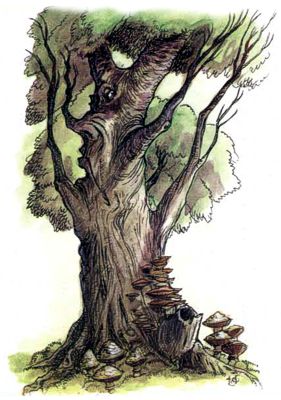

City of Delights • Monstrous Compendium Annual, Volume One

| Climate/Terrain: | Temperate or tropical forest |
|---|---|
| Frequency: | Very rare |
| Organization: | Solitary |
| Activity Cycle: | Day |
| Diet: | Blood |
| Intelligence: | Animal (1) |
| Treasure: | See below |
| Alignment: | Neutral |
| No. Appearing: | 1 |
| Armor Class: | 7 |
| Movement: | 0 |
| Hit Dice: | 12+4 |
| THAC0: | 7 |
| No. of Attacks: | 1-100 |
| Damage/Attack: | 1 |
| Special Attacks: | Singing |
| Special Defenses: | Singing |
| Magic Resistance: | 25% |
| Size: | L (10-20’ tall) |
| Morale: | Fearless (20) |
| XP Value: | 10,000 |
The singing tree is an odd plant creature that lures animals to rest nearby, then drains their blood to feed itself.
The singing tree appears to be a normal deciduous tree with uniquely shaped leaves. Each leaf of the tree sings with a lovely voice, the hundreds of them blending into a beautiful chorus. When it is hungry, the tree joins the chorus of higher-pitched leaves, adding its own bass line.
Combat: When the tree uses its bass line, all mammalian creatures within 100 yards must roll saving throws vs. spell; those who do not succeed feel compelled to stop for a bit and rest in the shade of the tree. When a potential victim rests beneath the tree, several leaves fly off the tree to attack.
At any time, the tree can send a number of leaves equal to its hit points. However, unless ravenously hungry, the tree sets only a few leaves on any one victim (typically 1d6 leaves per victim), to avoid notice.
Each leaf flutters down from its branch, appearing to fall naturally The small twig that connects the leaf to the tree also serves as a feeding tube, which the leaf inserts into exposed skin. For victims charmed by the tree’s music, the small pain of insertion is not noticed. After draining 1 hit point of blood, the leaf flutters away, then seems to rise on a breeze back into the tree’s branches. There, it reattaches itself to its branch, and feeds the blood to the tree. To remain healthy, the tree must each day consume a number of hit points of blood equal to its normal total.
Each leaf has 1 hp. Killing them individually is quite inefficient, for the tree has a number of leaves equal to ten times its hit points. If the tree is attacked with an area effect spell, such as a fireball, all leaves not attached to the tree are killed, if they are within the spell’s area of effect. In addition, a number of leaves on the tree equal to the total damage inflicted are also killed. The tree rolls saving throws as indicated by its Hit Dice, with normal effects for success.
Attacking the tree causes it to send all its leaves to attack. Besides their blood drain, the fluttering leaves can cause obscurement, lessening opponents’ attack rolls by -2. If the tree is killed, individual leaves die in 1d10 rounds.
Habitat/Society: In the wild, singing trees grow in secluded places far from humans and other intelligent beings. They use their music to lure unintelligent animals close, so they may feed upon them. The tree’s leaves vibrate in the wind; combined with their natural magic, this makes a lovely sound. Each leaf has a unique “voice”, and the tree’s music is indescribably beautiful. When the tree adds its lower tones, the song becomes very attractive and calming.
Each singing tree has its own territory, of about 100 yards in any direction from the bole. When a seed is produced (only once every five years), the tree sends a pair of leaves to take it far away, so it may claim another territory. If the seed is planted in a singing tree’s territory, the adult sends leaves to block sunlight from the sapling, and to attack the smaller tree’s leaves. This keeps the tree’s competition low. In addition, if several singing trees grow in close proximity, they soon over-hunt the area, and several of them die, leaving only the strongest. They live for centuries if well-fed.
Since the first singing tree was returned to civilization two generations ago, some wealthy individuals have tried to procure specimens for their own gardens. Many owners feed their trees, but others keep their trees hungry, so they will serve as guardians. A tree that is kept hungry turns feral eventually, sending all its leaves to attack any warm-blooded creature that enters its territory.
Ecology: A singing tree in the wild is similar to other predators, feeding on prey animals and facing few enemies of its own. Animals that damage wood are its greatest enemies.
To bring a tree to civilization, one of the rare seeds must be captured, or a tree must be carefully removed from the surrounding soil, with little damage to the roots. Transportation must also be gentle, and the tree must not be exposed to rapid changes in temperature or to extreme temperatures. Capturing a healthy adult tree also requires facing its music and bloodsucking leaves. A seed or a healthy tree can bring as much as 5,000 gold from an interested buyer.
